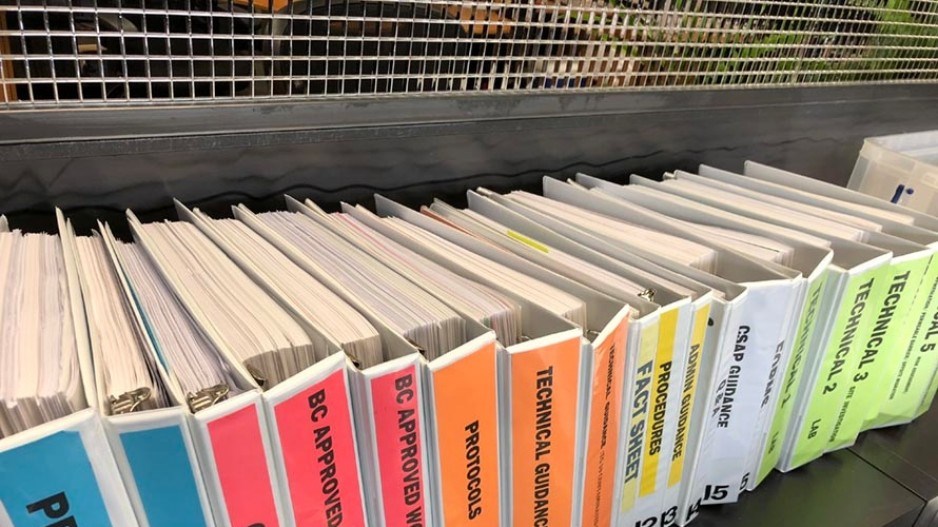Recommended changes to B.C.’s professional reliance model for resource industries is “a solution looking for a problem” that could take B.C. back to the days of the Forest Practices Code, which hamstrung forestry companies with red tape.
That’s how professional and business associations are reacting to recommendations released Thursday June 28 for overhauling how the provincial government regulates resource industries in B.C.
The recommendations –121 in all – are contained in a report by Mark Haddock, an environmental law professor at the University of Victoria, who was commissioned by the NDP government to review the professional reliance model.
One key recommendation is the creation of new legislation and an independent office to oversee professional associations that represent forestry professionals, engineers, geoscientists, agrologists, biologists and technicians.
COFI characterizes such an oversight office as “a regulator of regulators” that will add unnecessary layers of red tape.
“Mr. Haddock’s proposals would effectively take us back 25 years to a ‘forest practices code’ system, that was ultimately rejected as unworkable due to its highly prescriptive, costly, and gridlocked regulatory scheme,” said COFI president Susan Yurkovich.
The Business Council of British Columbia (BCBC) is calling on the NDP government to shelve the report, while Sonia Furstenau, Green MLA for Cowichan Valley, is urging its immediate implementation.
“The Business Council recognizes and supports continual improvement in the environmental regulatory framework,” said BCBC CEO Greg D’Avignon. “However, this report on professional reliance is a solution looking for a problem, with the resulting recommendations going beyond an assessment of how professionals actually work in British Columbia.”
Under the professional reliance model, mining, forestry and other resource companies must hire their own engineers, environmental consultants, geoscientists and professional foresters to conduct environmental impact studies and ongoing monitoring, for things like roads tailings dams and oil and gas infrastructure.
The professional reliance model came under intense scrutiny following the Mount Polley tailings pond collapse in 2014.
It has been criticized for putting the fox in charge of the henhouse, since much of the responsibility for that ensuring environmental regulations are followed is left up to non-government professionals, who are guided by the best practices of professional associations like the Association of BC Forest Professionals.
“In the wake of disasters like Mount Polley, it is clear that government needs to reclaim its central role in ensuring the highest possible degree of integrity in project approval in order to re-establish public trust,” Furstenau said.
Professional and business associations appear to have been blindsided by Haddock's report, saying it goes beyond what they were expecting.
“We are concerned that the report released today does not reflect the scope of the review that we felt we were being consulted on,” said Association of Mineral Exploration CEO Edie Thome. “In fact, the recommendations are largely focused on broad-sweeping changes to 28 regulatory regimes that go well beyond governance improvements, which we believed to be the focus of the engagement."
But some of the recommendations Haddock is making were also made as far back as 2014 by the B.C.’s Ombudsman.
“These recommendations very clearly align with ones we have made in the past,” said B.C. Ombudsman Jay Chalke. “I am hopeful government will make critical changes that my office and others have been continuing to recommend.”
If the government acts on Haddock’s key recommendation to establish a new Office of Professional Regulation and Oversight, the Engineers and Geoscientists BC warns that it could add costs and red tape to resource industries.
“While the report includes a number of positive recommendations, it also recommends sweeping changes to the governance of regulators like Engineers and Geoscientists BC that raise a number of concerns,” the association said in a press release.
“In particular, we are concerned that the creation of a new Office of Professional Regulation and Oversight would add cost as well as an additional layer between government and practicing professionals without a clear indication of how it would improve the regulatory model.”
“At this point, the most sensible thing the government can do is shelve this report,” D’Avignon said. “Overall, the professional reliance system is working well. No convincing evidence has been brought forward in this report that the province ought to abandon or fundamentally change it.”
@nbennett_biv




